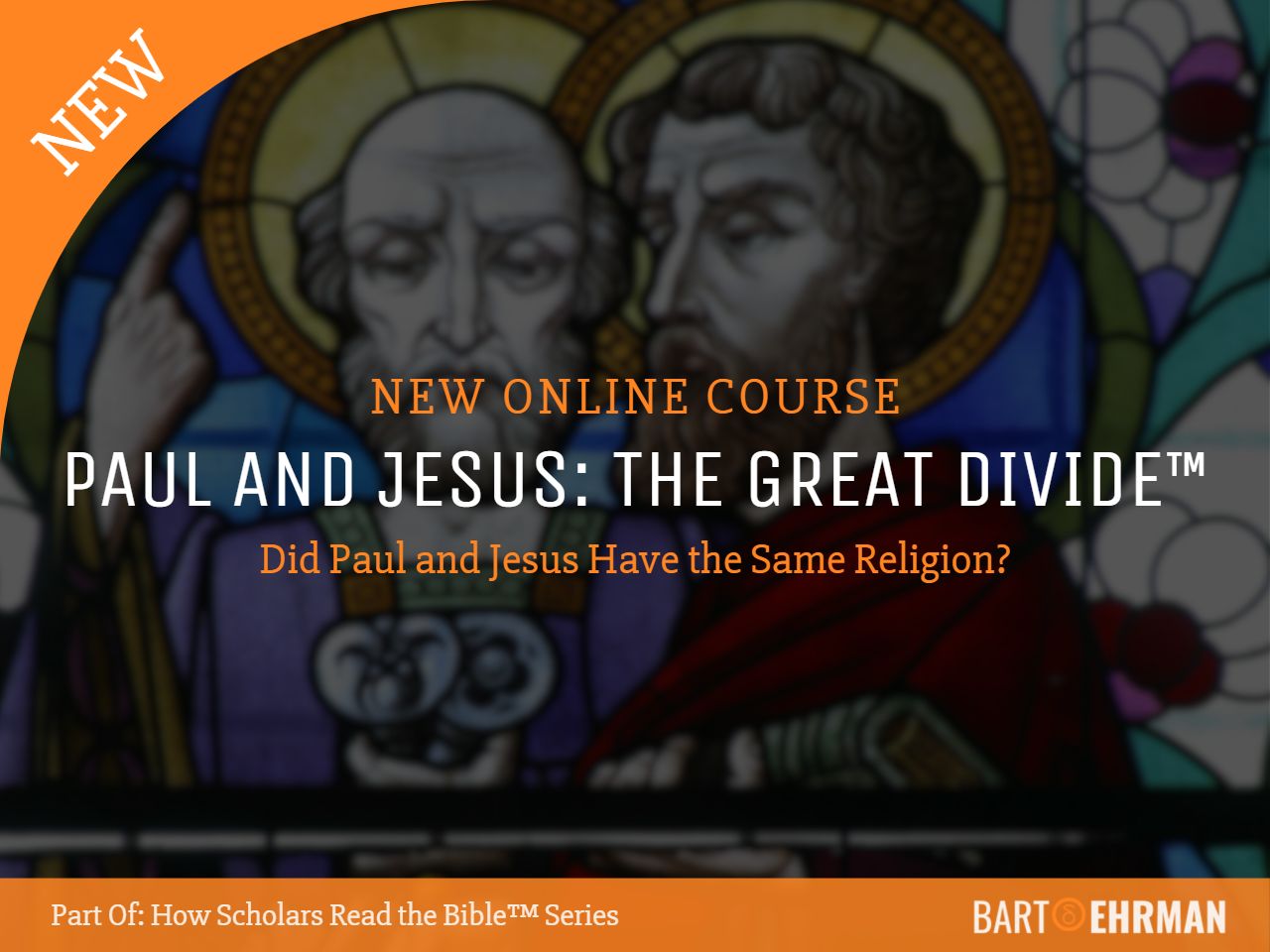When Did Christianity Start? Origin Story of the Religion

Written by Joshua Schachterle, Ph.D
Author | Professor | Scholar
Author | Professor | BE Contributor
Verified! See our editorial guidelines
Verified! See our guidelines
Date written: March 21st, 2024
Disclaimer: The views and opinions expressed in this article belong to the author and do not necessarily match my own. - Dr. Bart D. Ehrman
When did Christianity start? This question may seem simple, but it actually contains a deep complexity which makes a definitive answer hard to come by. In fact, scholars continue to debate about the origin of Christianity and there is no absolute consensus about when it occurred.
In this article, I’ll look at several different possible answers. Did Christianity begin when Jesus was born, signaling, for Christians, the dawn of God’s salvation for humans? Was Christianity created with the advent of Jesus’ ministry, when he outlined his teachings for his followers? Was it perhaps when his disciples came to believe that he had been resurrected after his crucifixion? Or did it start with Paul’s calling/conversion?

The Case for 4-6 BCE: Did Christianity Start at the Birth of Christ?
While neither the Gospel of Mark nor the Gospel of John contain birth narratives of Jesus, for Matthew and Luke, his birth story is crucial. It is the story of Jesus’ miraculous conception that argues for his birth as the founding moment of Christianity.
Matthew begins his Gospel with a genealogy of Jesus, a genealogy which links him directly to the Jewish patriarchs Abraham, Isaac, and Jacob, but also to David, Israel’s greatest king. This is the beginning of Matthew’s argument that Jesus is the long-awaited Davidic Messiah. But Jesus’ birth narrative in Matthew goes even further.
The author starts off with a huge statement, tossed off rather casually:
“When his mother Mary had been engaged to Joseph, but before they lived together, she was found to be pregnant from the Holy Spirit.”
In other words, Jesus’ conception was the result of divine intervention. This emphasizes that Jesus’ true nature is both human, through his mother, and divine. In addition, the prophecy Matthew refers to, Isaiah 7:14, says the child’s name will be “Emmanuel” which in Hebrew means “God with us.”
Although Jesus isn’t literally named Emmanuel, the meaning is clear for Matthew: Jesus’ conception and birth are God’s miraculous effort to reach out to human beings. It is the start of a new path for humans to connect with God.
Luke’s Gospel has a similar narrative, but reinforces Jesus’ divine nature even further by having an angel announce the impending pregnancy to Mary in Luke 1:35:
“The Holy Spirit will come upon you, and the power of the Most High will overshadow you; therefore the child to be born will be holy; he will be called Son of God.”
Again, the child will be human and divine, the connecting point between humanity and divinity. The case could be made, therefore, that the birth of Jesus was the beginning of Christianity, since many Christians believe that this was the beginning of a new covenant between human beings and God.
However, it must be noted that this is a theological rather than a historical argument. For a historian of Christianity like me, the birth of Jesus cannot be defined as the founding moment of Christianity. At the point of Jesus’ birth, he had no teachings, no followers, nothing that could be classified as a religion or even a minor sect. I’m afraid we must look elsewhere for Christianity’s origin.
The Case for 27-29 CE: Did Christianity Start at the Beginning of Jesus’ Ministry?
Most scholars agree with Paul Barnett that Jesus’ ministry began sometime between 27 and 29 CE and lasted about three years. Perhaps this is when Christianity started.
Jesus’ teachings, often communicated through parables to make deeper truths comprehensible, encompassed categories common to most religions. They included ethics (Love your enemies, The Golden Rule) and faith (Trust God to provide for your needs). Since most religions certainly contain rules of ethical behavior and articles of faith, could this have been the advent of Christianity?
While this argument could certainly have been made during Jesus’ lifetime, it would be hard to call this a conclusive answer since we know the end of Jesus’ story. Most Christians would certainly agree that Jesus’ teachings are important. However, what is most significant about Jesus for Christians isn’t his teachings but rather his salvific death and resurrection.
If his followers – and all the people they would later convince – hadn’t believed that Jesus had defeated death, thereby bringing salvation to humanity, it’s difficult to imagine that his mere teachings would have been enough to sustain an entire religion for two millennia.
In addition, Paula Fredriksen notes “how completely embedded [Jesus] is in [the] 1st-century Jewish world of religious practice and piety.” It’s common to read the Gospels as the foundation of what would eventually become a separate religion, but the Gospel authors themselves don’t say this at all. In other words, Jesus’ teachings were interpretations of already-existing Jewish teachings, not the intentional foundation for a new religion.
The Case for 30-36 CE: Was Christianity Founded at Jesus’ Resurrection?
When Jesus was arrested and killed by the Roman authorities, his disciples must have felt disoriented. They had been following this charismatic man for several years, listening to his teachings, and gleaning wisdom from him. In addition, they may have believed that he was the Messiah.
If they did, all their Messianic hopes were dashed. As John J. Collins notes, while there were diverse beliefs in the 1st century about what the Messiah would do when he came, none of these beliefs predicted a Messiah who would be killed in the most shameful way possible. Surely, the disciples initially thought that they had been wrong about Jesus.
But then something happened: the disciples came to believe that Jesus had been raised from the dead. In other words, God had vindicated him as Messiah by resurrecting him. Jesus was therefore a Messiah of a different kind. Instead of retaking Israel from its oppressors, this Messiah willingly experienced suffering, death, and resurrection in order to absolve humanity of its sins.
Bart Ehrman thinks this conviction was the most essential condition for the establishment of Christianity. In fact, he says belief in the resurrection of Jesus “can be considered the key not only to later Christian views of Jesus, but also to the question of when Christianity started as a distinct set of beliefs and practices.” More importantly, he says that before Jesus’ followers believed in his resurrection, there was little to differentiate them from other Jews.
Could this be when Christianity started? I think we could make a good case for this. However, it all depends on how we choose to define Christianity.
It’s clear that Jesus’ disciples never stopped thinking of themselves as good, religious Jews (like Jesus). The fact that they believed in the resurrection of Jesus motivated them to preach to others that he was the promised Messiah. But our evidence tells us that they were still going regularly to the Temple in Jerusalem and still reading or listening to the Jewish Scriptures (see Acts 3).
So, if we define Christianity only as a religion completely separate from Judaism, this early church was still not Christian. If, on the other hand, we define it as a sect of Judaism, just like the Pharisees, Sadducees, and Essenes, then the argument that Jesus’ resurrection was the beginning of Christianity makes sense.
The Case for 33-36 CE: Was Christianity Founded at Paul’s Conversion?
Gerd Lüdemann has argued that the Apostle Paul was the true founder of Christianity. Paul, a devout Jew, had a visionary experience of the risen Christ sometime between 33 and 36 CE which convinced him to follow Jesus as the Messiah. He also believed he had been called by God to preach this truth to Gentiles, allowing them access to God’s salvation as well. Was this visionary experience the beginning of Christianity?
One way to answer this question, according to Bart Ehrman, is to remember that before Paul’s conversion experience, he writes that he was persecuting the church (Galatians 1:13). In other words, Christians (defined as a sect of Judaism) already existed. And yet after his conversion, he barely mentions the life or teachings of Jesus in his letters.
Why is this?
For Paul, the importance of Jesus was not found in his teachings but in his resurrection. Paul, as a Pharisee (Philippians 3:5), believed that when God’s kingdom came, there would be a general resurrection of all the righteous people who had died. He thus believed that Jesus’ resurrection signaled the beginning of this general resurrection. God resurrected his Messiah first, and the rest of the righteous dead would come next.
In other words, for Paul, the Gentile communities he created were part of a religious group about Jesus, not the one created by Jesus. Jesus’ words were secondary: it was his identity as the resurrected Messiah that mattered.
Since Christianity went on to become a religion about Jesus, one could make a good argument that this was the beginning of that religion.
However, I’d like to highlight one more intriguing possibility.

The Case for the 4th Century CE: Did Christianity Start Much Later?
Daniel Boyarin, a scholar of Judaism and Early Christianity, made a bold pronouncement in his book, Border Lines: the Partition of Judeo-Christianity. He claimed that the true separation of Judaism and Christianity happened much later than had previously been assumed.
He writes that the ultimate borders between Judaism and Christianity were not drawn “on the ground” by everyday practitioners, but were imposed by elite, Gentile Christian authors who wanted to create a completely separate identity for Christianity.
Historically, this makes sense. For example, in the 4th century, 300 years after Jesus’ life, John Chrysostom, a well-known Christian bishop in the city of Antioch, Syria, gave a series of alarmingly antisemitic sermons. His reason for doing this was that Christians in his parish were regularly visiting and participating in worship at the local synagogue in addition to his Christian church. John did not approve.
It seems mind-blowing to think about now, but apparently some Christians still saw Judaism and Christianity as essentially undivided centuries after the life and death of Jesus.
Consequently, if we define Christianity as a religion entirely separate from Judaism, the way we think of it today, we have to argue that this ultimate separation, this founding of a Christian religion entirely independent of Judaism, came much, much later.
Conclusion: When Did Christianity Start?
When did Christianity start? In this article, I’ve discussed several possibilities for its origin.
First, I proposed the notion that it began with the birth of Jesus in 4-6 BCE. According to Matthew and Luke, Jesus’ birth was a miraculous connection between divinity and humanity. However, since we’re discussing the founding of a religion, calling Jesus’ birth the moment of Christianity’s founding is not a good historical argument.
Next, I asked whether Christianity began with Jesus’ ministry in 27-29 CE. Jesus’ teachings continue to be important for Christianity, but ultimately the religion was founded on beliefs about Jesus rather than on the practice of his teachings alone.
I also examined the idea that Christianity began with Jesus’ resurrection in 30-36 CE. This makes sense in some ways: it was belief in the resurrection that really made Christianity different from other forms of Judaism. If we define Christianity at its inception as a sect of 1st-century Judaism, then the beginning of the belief in Jesus’ resurrection is a good candidate for the moment of its foundation.
Likewise, we could make a case for Christianity beginning with Paul’s conversion. Paul, after his experience of Christ, focused much more on Jesus as the Messiah whose resurrection signaled the impending end of the current world than on Jesus’ teachings. Since Paul preached, and perhaps even created a religious movement about Jesus rather than the one created by Jesus, this is a reasonable argument. However, since Paul was a faithful Jew, we must still define his Christianity as a sect of Judaism.
Finally, I highlighted Daniel Boyarin’s thesis that Christianity did not truly separate from Judaism for several centuries. As I noted, at least some Jesus-followers were engaging in Jewish practices in the 4th century. If we define Christianity as a totally separate religion, it may not have actually started until at least the 4th century.


